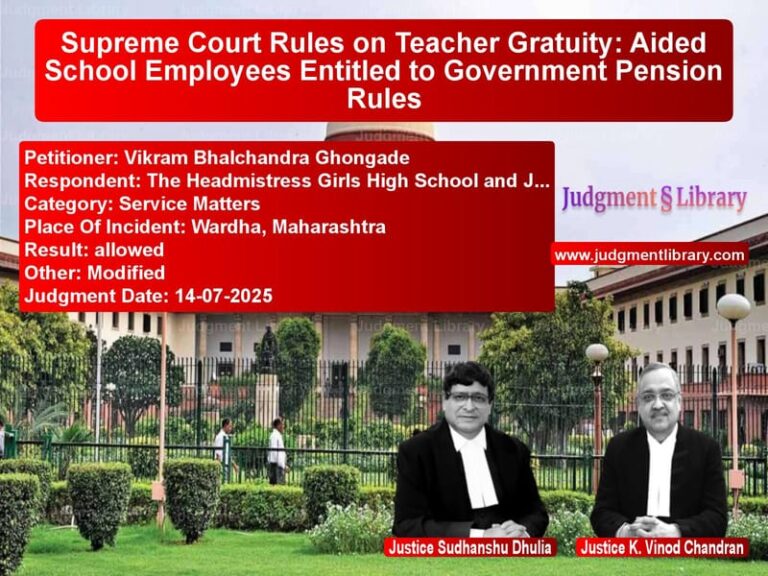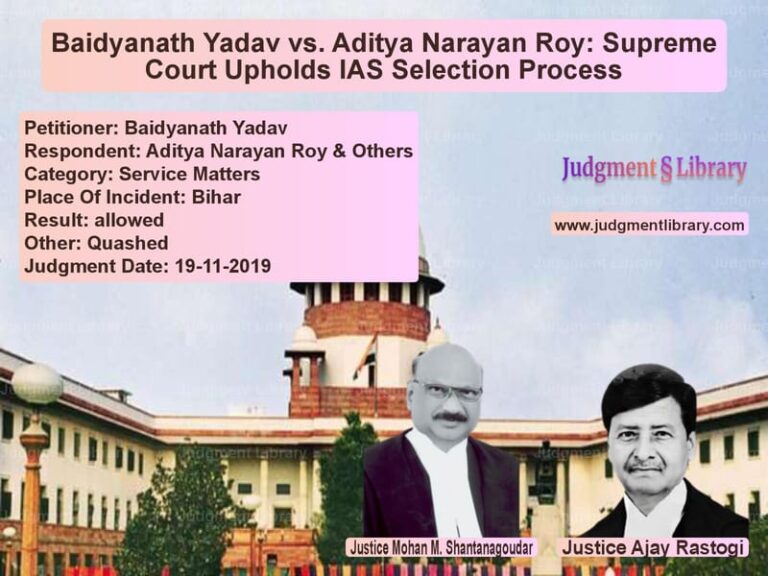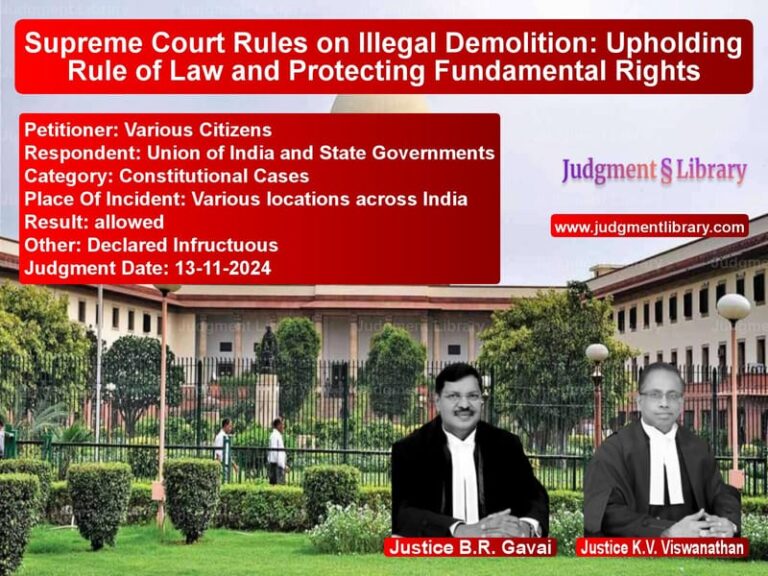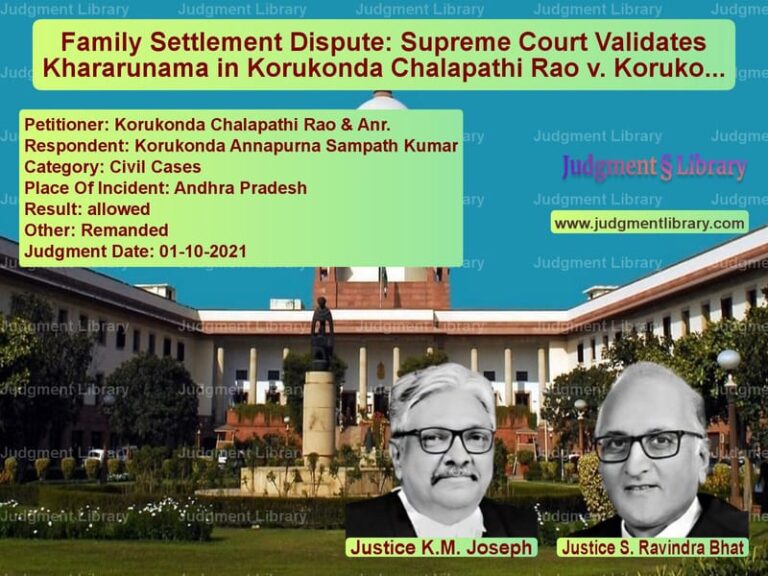Reinstatement and Back Wages in Unfair Termination: Supreme Court’s Ruling
Employment disputes in India often involve issues of wrongful termination, procedural violations, and unfair treatment under labor laws. In the case of Jeetubha Khansangji Jadeja v. Kutchh District Panchayat, the Supreme Court of India was called upon to decide whether an illegally terminated employee was entitled to reinstatement along with back wages. The Court ruled in favor of the workman, ordering reinstatement and compensation, setting an important precedent in labor jurisprudence.
Background of the Case
The dispute arose when the appellant, Jeetubha Khansangji Jadeja, was terminated from employment by the respondent, Kutchh District Panchayat, without notice and without following the prescribed procedure under the Industrial Disputes Act, 1947. Jadeja was employed as a Watchman since 1992 and had worked for more than a decade before his sudden termination on December 30, 2002.
Key Issues in the Case
The case raised several important legal issues:
- Was the termination of the appellant legal under the Industrial Disputes Act?
- Did the appellant fulfill the requirement of continuous service under Section 25B of the Act?
- Was the appellant entitled to reinstatement, back wages, or alternative relief?
Arguments by the Petitioner (Appellant – Jeetubha Khansangji Jadeja)
The appellant argued that:
- He was employed continuously since 1992 and was wrongfully terminated without notice.
- The employer failed to maintain proper employment records, and junior employees were retained while he was removed.
- The termination violated Section 25G of the Industrial Disputes Act, which mandates the principle of ‘last come, first go’ in retrenchment.
- The labor court had rightly ruled in his favor, and the Gujarat High Court had also upheld the reinstatement order.
- Despite these favorable rulings, the employer dragged the case for over a decade, causing undue hardship to him.
Arguments by the Respondent (Kutchh District Panchayat)
The respondent contended that:
- The appellant was a temporary employee and did not meet the requirement of 240 days of continuous service in a given year.
- The employment records were destroyed in a natural calamity, making it difficult to verify his claims.
- The labor court’s order for reinstatement was excessive, and instead, a lump sum compensation should have been granted.
- Since the appellant was out of employment for over 20 years, reinstatement was impractical.
Findings of the Supreme Court
The Supreme Court, consisting of Chief Justice Uday Umesh Lalit and Justice S. Ravindra Bhat, examined the case and made the following key observations:
1. Violation of Industrial Disputes Act
The Court held that the termination was illegal since the employer failed to produce complete employment records. The appellant’s claim that he had worked continuously for over a decade remained unchallenged, leading to an adverse inference against the employer.
Read also: https://judgmentlibrary.com/supreme-court-remits-panchayat-employees-dismissal-for-fresh-inquiry/
2. Retention of Junior Employees
The Court noted that the employer had retained workers junior to the appellant while terminating him, which violated Section 25G of the Industrial Disputes Act.
3. Reinstatement vs. Lump Sum Compensation
The Court rejected the Division Bench’s decision to substitute reinstatement with a lump sum compensation of ₹1 lakh. It held that since the labor court and the single judge had ruled in favor of reinstatement, substituting this relief was unjustified.
4. Grant of Back Wages
Considering the long litigation period, the Court awarded back wages for two years immediately preceding the judgment, stating:
“The appellant shall be entitled to back wages for a period of two years immediately preceding, i.e., from 01.01.2020 to 01.01.2022.”
Final Judgment
The Supreme Court ruled:
- The appellant must be reinstated within six weeks.
- Back wages for two years (01.01.2020 to 01.01.2022) should be paid at current rates within six weeks.
- Continuity of service was restored as directed by the labor court and the single judge.
Key Takeaways from the Judgment
This ruling establishes several important principles:
1. Employer’s Failure to Maintain Records Benefits the Workman
The employer’s inability to produce complete records led to an adverse inference, strengthening the appellant’s case.
2. Reinstatement as the Primary Relief
Unless there are strong reasons to the contrary, reinstatement should be the default remedy for illegal termination.
3. Limited Back Wages
Instead of full back wages, the Court took a balanced approach by awarding compensation for two years.
Conclusion
The Supreme Court’s decision in Jeetubha Khansangji Jadeja v. Kutchh District Panchayat reinforces employee rights against unfair termination. By mandating reinstatement and awarding back wages, the Court ensures that employees wrongfully dismissed receive fair justice. This judgment sets a crucial precedent for labor disputes, emphasizing procedural fairness and the protection of workers under the Industrial Disputes Act.
Petitioner Name: Jeetubha Khansangji Jadeja.Respondent Name: Kutchh District Panchayat.Judgment By: Justice Uday Umesh Lalit, Justice S. Ravindra Bhat.Place Of Incident: Kutchh, Gujarat.Judgment Date: 23-09-2022.
Don’t miss out on the full details! Download the complete judgment in PDF format below and gain valuable insights instantly!
Download Judgment: jeetubha-khansangji-vs-kutchh-district-panc-supreme-court-of-india-judgment-dated-23-09-2022.pdf
Directly Download Judgment: Directly download this Judgment
See all petitions in Employment Disputes
See all petitions in Termination Cases
See all petitions in Judgment by Uday Umesh Lalit
See all petitions in Judgment by S Ravindra Bhat
See all petitions in allowed
See all petitions in Remanded
See all petitions in supreme court of India judgments September 2022
See all petitions in 2022 judgments
See all posts in Service Matters Category
See all allowed petitions in Service Matters Category
See all Dismissed petitions in Service Matters Category
See all partially allowed petitions in Service Matters Category







